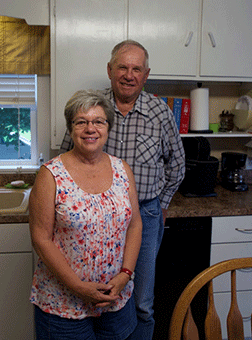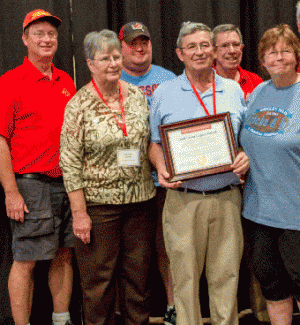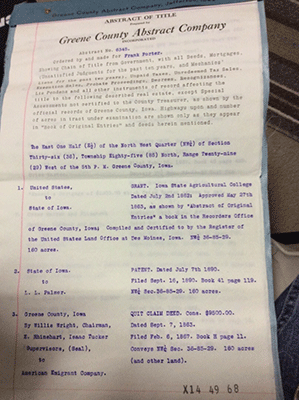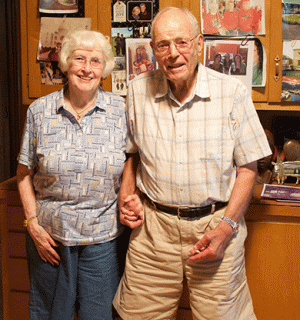Cherokee County, Parcel at T92N, R40W, Sec. 28, NE
2016 marks the 50th year that this land has been owned by my family, as my grandfather, Levi Lundquist, was one of several people at the time who purchased ground in the NE ¼ of Section 28 in Cherokee Township in 1966. It is my understanding that the ground at that time was purchased from the State of Iowa/Cherokee Mental Health Institute.
Throughout the years this tract of land, as it lies within the Cherokee city limits, has been subdivided in smaller parcels or lots, However the ground in the NE ¼ of Section 28 that is still used for agricultural purposes remains within the Lundquist family.
Learning that this is a land grant parcel makes us proud as we have deep educational ties to Iowa State University. My father, Robert Lundquist graduated from ISU in 1959; both of my brothers, Allan and John Lundquist graduated from ISU as did their wives, Michele and Theresa; and my son, Levi, is the third generation in my family to attend Iowa State University. All this, it seems fitting that our family remains intertwined within the Iowa State University Land Grant Legacy.
-Kent Lundquist, Cherokee
Submitted with validation
 Pocahontas County, Parcel at T90N, R31W, Sec. 28, SE
Pocahontas County, Parcel at T90N, R31W, Sec. 28, SE
It is still the quarter section, less 10 acres sold as an acreage in 1969 to a Johanns, present owner is Russ Lamphier. The remaining 150 acres is divided 3 ways to Gene and Charity Young’s daughters – Janet Lee, Kathleen Kaufman, and Cheryl Ernst.
No connection to ISU. Been in the family 66 years. It had a very winding creek before the dredge back in the early- to mid-50s when they straightened it. Our dad was one of the first to do contour farming receiving a certificate for it I think from SCC.
-Kathleen Kaufman, Manson
Submitted with validation
Wright County, Parcel at T90N, R24W, Sec.32, NE
My father purchased the farm as shown in the contract dated September 21, 1961. William S. and Ethel B. Weir to Cyril E. and Alice M. Hauser.
The N1/2 of NW ¼ and the NW1/4 of the NE ¼ of Section 32 and the W ½ of the SW ¼ of Section 29, all in Township 90 North Range 24 West 5 Th P.M. Iowa.
 Ownership passed on to Alice M. Hauser after my father, Cyril E. Hauser died February 29, 1988. Ownership passed on to Rolland K. Hauser, Dennis P. Hauser, Nita Houser Jacobs and Gayle Hauser Kloewer after my mother, Alice M. Hauser died July 7, 1994.
Ownership passed on to Alice M. Hauser after my father, Cyril E. Hauser died February 29, 1988. Ownership passed on to Rolland K. Hauser, Dennis P. Hauser, Nita Houser Jacobs and Gayle Hauser Kloewer after my mother, Alice M. Hauser died July 7, 1994.
Charlene and I agreed to purchase the farm from my brother and sisters in December 1995. I would like to mention that my father was involved in an Iowa State College research project concerning the early weaning of piglets in the 1950s.
I attended a meeting in Curtiss Hall with my father where the project was discussed along with the development of the feed supplement necessary for the development of these young pigs. My father did participate in the early weaning and feeding the feed supplement developed by Iowa State College Research.
My brother Rolland, sister Nita, and I are ISU graduates. We were members of Iowa State Singers. Nita met her husband to be, Bill Jacobs, at Iowa State. Charlene’s and my boys, Richard, Robert, and Ronald are ISU graduates. While working in Ames as a Music Director at St. Cecilia Church our son, Robert met his future wife to be Janean Fair, an ISU graduate for her Master’s Degree. Their two children are also ISU graduates.
As a bit of trivia, our grandson played basketball on the same court as Harrison Barnes at Ames High School. While long term substitute teaching I held a parent-teacher conference for a very nice son of the very receptive and famous Sukup Family of Sheffield, Iowa.
-Dennis and Charlene Hauser
Submitted with validation
Greene County, Iowa 160 acre parcel at T84N, R29W, Sec. 12, SW - Early History
 In 1882, Benjamin Guise purchased the land from the state of Iowa, becoming the first person to own the parcel. Benjamin and his wife, Melinda, appeared to be restless prior to settling down in Greene County.
In 1882, Benjamin Guise purchased the land from the state of Iowa, becoming the first person to own the parcel. Benjamin and his wife, Melinda, appeared to be restless prior to settling down in Greene County.
Their first son, Cyrus, was born in Indiana. Anna, the eldest daughter, was born in California. Their next two daughters, Alice and Dora, were both born in Illinois followed by another daughter, Maud, born in Indiana. Estella, the youngest child, was born in Iowa. Despite the initial restlessness, Benjamin finally settled his family in Greene County where he farmed until his death in 1913.
The parcel changed hands for two decades and was split in half – 80 acres came to be owned by the Schrum family. Steve Schrum, the current owner, inherited the land from his father who purchased it in 1939 after his immigration from Germany and farming in Boone and Greene Counties since the late 1920s. The Schrum family has focused largely on corn and bean rotations while also raising beef cattle, hogs, and broilers for some time.
The Schrums have a history of embracing new technologies. Steve’s father viewed his purchase of a tractor with a cab and air conditioning a welcome upgrade. Today Steve struggles, but appreciates, his son’s purchase of a combine with auto steering and yield monitors. While the new technologies can be overwhelming, Steve believes that he needs to keep up with them in order to be the best steward of the land he can be. His family takes great pride in maintaining the integrity of the land - something the Iowa Agricultural College and Model Farm pushed for when it opened in 1858.
Doug and Karen Wegner purchased the other 80 acres in 1986. Like the Schrums, they had a corn and soybean rotation. They also raised hogs for a time before getting out of the business to free up time for them to travel. Despite being out of Iowa for much of the year, they have a close connection to the land. They see it as a way to ensure their children and grandchildren have the opportunity to own land and benefit from what it produces. They use the land as a way to maintain the family legacy; a little piece of Iowa farmland that no matter how far they venture from home they can always point to something that they have in common.
- By Brandon Duxbury, from interviews with
Steve Schrum and Doug and Karen Wegner
Dickinson County, Parcel at T99N, R36W, Sec. 1, SW
This parcel has its own unique and interesting history. In 1850, Congress passed a bill entitled the Swamp Land Act. Focused largely at the Everglades in Florida but applicable to any state and territory of the U.S., the act encouraged the drainage and development of swamplands in order to make them both more productive and habitable. At that time many Americans began moving west, drawn by the lure of free land and wealth. Some enterprising individuals found their wealth in selling land fraudulently as appears to be the case with this parcel in Dickinson County.
In 1859, two men, John D. Rowe and Alfred D. Arthur, entered into a contract with Dickinson County to build a courthouse and two bridges in exchange for land under the Swamp Land Act. Over the next decade, Rowe and Arthur worked in collusion with nine “assignees” to fraudulently acquire approximately 26,000 acres of land. No work was completed, or even begun, on the courthouse and bridges. After realizing Rowe and Arthur scammed them, county officials filed a petition against the two men in 1870. When neither man appeared before the court, the judge determined the contract to be fraudulent and returned the land back to the county. One quarter section of those 26,000 fraudulently obtained acres happened to be an Iowa State land grant section selected by Peter Melendy seven years earlier.
The first person to legally own the parcel after these turbulent years was Edmund Hummel. Having experienced losing his farm near Sioux City during the Depression years and knowing the corrupt dealings this particular parcel had been involved in, Edmund took steps to ensure that his purchase of the property was both legal and binding. Immediately after he purchased the land in 1952, he contacted the U.S. Department of the Interior to transpose a document proving the sale was legitimate. After receiving the document he took an extra step to prove its legitimacy by taking it to the Dickinson County courthouse to get it approved and recorded by the County clerk.
Once Edmund was satisfied that he could prove the chain of title, he began his farming operation. He slowly acquired a few more parcels over the years and raised the whole nine yards: hogs, cattle, chickens, and row crops. The Hummel’s continued the diverse operation until the mid-1990s when the hog market collapsed. They have since demolished the old hog confinement buildings and focus on raising row crops.
The farm is currently managed by Dan Hummel and his brother while their father holds a share of it. Aware of the family legacy and the unique history of the parcel, they both plan to pass the land on to their children.
- By Brandon Duxbury, from interviews with
Dan Hummel, Spirit Lake
Woodbury County, Parcel at T89N, R44W, Sec. 6, SW
Prior to purchasing the parcel from W.H. Rawson, Helen Maxwell’s grandparents operated the First Trust and Savings Bank in Moville. Established in 1919, it quickly became one of the strongest banks of its size in the U.S. based on sound business practices. They not only limited the number of loans they approved but also scheduled appointments with their clients to ensure they were in good standing. Their competitors in town approached the business differently, they approved loans too leniently. After the Great Depression of the 1930s only the First Trust and Savings Bank remained.
 Soon after the Depression ended, Helen’s father purchased the parcel to farm row crops and raise hogs and cattle. By the time Earl and Helen bought the farm from her father the hog confinement buildings were old and needed to be updated. Rather than demolish them to make way for new buildings, Earl worked with agricultural engineers from Iowa State University to remodel the existing buildings. The partnership allowed him to incorporate new ideas and practices in order to produce better quality hogs. They did well but eventually phased out of the hog business when they began having difficulty finding enough help to take care of them.
Soon after the Depression ended, Helen’s father purchased the parcel to farm row crops and raise hogs and cattle. By the time Earl and Helen bought the farm from her father the hog confinement buildings were old and needed to be updated. Rather than demolish them to make way for new buildings, Earl worked with agricultural engineers from Iowa State University to remodel the existing buildings. The partnership allowed him to incorporate new ideas and practices in order to produce better quality hogs. They did well but eventually phased out of the hog business when they began having difficulty finding enough help to take care of them.
Both Helen and Earl Maxwell attended Iowa State University before moving back to Moville to farm and to open a veterinary clinic. Earl credits Iowa State for teaching him a valuable lesson: learning how to learn. The Maxwells have not only continued to learn but also have shown a willingness to share their knowledge as they have been active world travelers. They have visited over 130 countries and talked to farmers and veterinarians. Even now in retirement, Earl jokes that his job is to do the research on new veterinary and farming techniques and technology for his sons to implement in the farming and veterinary operations.
What is most striking about the Maxwells is how much they care for the community and the people who work for them. They use the word family to describe their operation. But they don’t just use it to mean their relatives. The farm managers and hired labor mean just as much to the Maxwells as their own family. They offer to rent their farmhouses at affordable prices to help people down on their luck and provide meat to their employees to save them money at the store. The strong community that the Maxwells are building is done humbly, quietly, and often without recognition. But their ability to run their community-oriented business, even as family farms are making way for large industrial farms, represent the unique character of rural Iowans.
- By Brandon Duxbury, from interviews with
Earl and Helen Maxwell
